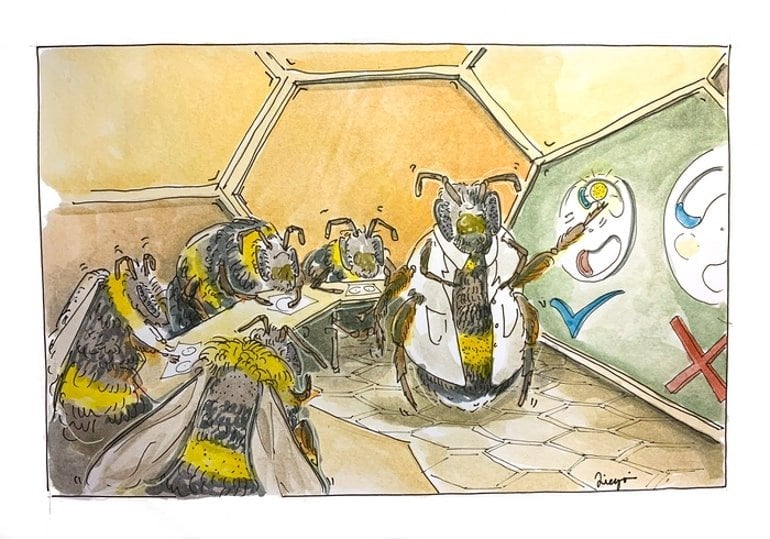Summary: Bumblebees are able to learn to solve puzzles by watching more experienced bees complete a task. This new behavioral preference then spreads throughout the entire colony. The bees that learned from others became more adept and began to prefer the learned solution over alternatives.
Source: PLOS
Bumblebees learn to solve a puzzle by watching more experienced bees, and this behavioral preference then spreads through the colony, according to a study published March 7th in the open access journal PLOS Biology by Alice Dorothy Bridges and colleagues at Queen Mary University of London, UK.
Social animals like primates are skilled at learning by watching others, and previous work has shown that individual bees can learn tasks in this way, but it remained unclear whether these new behaviors would then spread through the colony.
To investigate, researchers tested six colonies of bumblebees (Bombus terrestris) using a puzzle box that could be opened by rotating a lid to access a sugar solution. The bees could rotate the lid either clockwise or anticlockwise by pushing one of two different colored tabs.
The researchers trained bees to use one of these two solutions and then released these ‘demonstrator’ bees into a foraging arena alongside untrained bees and filmed them over a period of six to twelve days.
Foraging bees with a demonstrator opened more puzzle boxes than control bees, and used the same puzzle solution that the demonstrator had been taught 98% of the time, suggesting that they learned the behavior socially rather than stumbling upon a solution themselves.

In experiments where multiple demonstrators were each taught a different solution to the puzzle, untrained bees initially learned to use both methods, but over time they randomly developed a preference for one solution or the other, which then came to dominate in that colony.
The study is the first to document the spread of different behavioral approaches to solving the same problem in bees. The results provide strong evidence that social learning is important for the transmission of new behaviors through bumblebee colonies, as has previously been shown in primates and birds, the authors say.
Bridges adds, “These results in bumblebees, which are tiny-brained invertebrates, echo those previously found using similar experiments in primates and birds – which were used to demonstrate the capacity of those species for culture.”
Funding: This study was funded by an Engineering and Physical Sciences Research Council programme grant, “Brains on Board” (ref. no. EP/P006094/1 to L.C.) and a Queen Mary University of London PhD studentship (to A.B.). The funders had no role in study design, data collection and analysis, decision to publish, or preparation of the manuscript.
About this neuroscience research news
Author: Claire Turner
Source: PLOS
Contact: Claire Turner – PLOS
Image: The image is credited to Diego Perez-Lopez, PLOS (CC-BY 4.0, https://creativecommons.org/licenses/by/4.0/)
Original Research: Open access.
“Bumblebees acquire alternative puzzle-box solutions via social learning” by Alice Dorothy Bridges et al. PLOS Biology
Abstract
Bumblebees acquire alternative puzzle-box solutions via social learning
The astonishing behavioural repertoires of social insects have been thought largely innate, but these insects have repeatedly demonstrated remarkable capacities for both individual and social learning. Using the bumblebee Bombus terrestris as a model, we developed a two-option puzzle box task and used open diffusion paradigms to observe the transmission of novel, nonnatural foraging behaviours through populations.
Box-opening behaviour spread through colonies seeded with a demonstrator trained to perform 1 of the 2 possible behavioural variants, and the observers acquired the demonstrated variant. This preference persisted among observers even when the alternative technique was discovered.
In control diffusion experiments that lacked a demonstrator, some bees spontaneously opened the puzzle boxes but were significantly less proficient than those that learned in the presence of a demonstrator. This suggested that social learning was crucial to proper acquisition of box opening.
Additional open diffusion experiments where 2 behavioural variants were initially present in similar proportions ended with a single variant becoming dominant, due to stochastic processes.
We discuss whether these results, which replicate those found in primates and birds, might indicate a capacity for culture in bumblebees.






